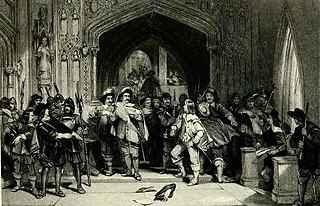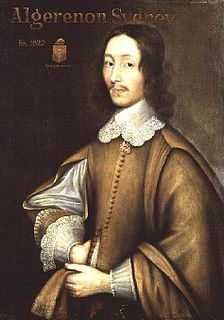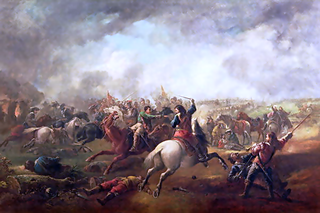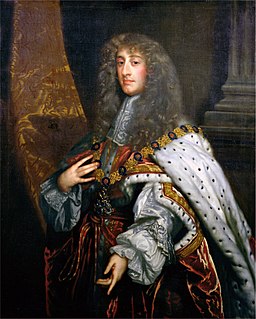
Charles I was King of England, Scotland, and Ireland from 27 March 1625 until his execution in 1649. He was born into the House of Stuart as the second son of King James VI of Scotland, but after his father inherited the English throne in 1603, he moved to England, where he spent much of the rest of his life. He became heir apparent to the three kingdoms of England, Scotland, and Ireland in 1612 on the death of his elder brother Henry Frederick, Prince of Wales. An unsuccessful and unpopular attempt to marry him to the Spanish Habsburg princess Maria Anna culminated in an eight-month visit to Spain in 1623 that demonstrated the futility of the marriage negotiations. Two years later, he married the Bourbon princess Henrietta Maria of France.

The English Civil War (1642–1651) was a series of civil wars and political machinations between Parliamentarians ("Roundheads") and Royalists ("Cavaliers"), mainly over the manner of England's governance and issues of religious freedom. It was part of the wider Wars of the Three Kingdoms. The first (1642–1646) and second (1648–1649) wars pitted the supporters of King Charles I against the supporters of the Long Parliament, while the third (1649–1651) saw fighting between supporters of King Charles II and supporters of the Rump Parliament. The wars also involved the Scottish Covenanters and Irish Confederates. The war ended with Parliamentarian victory at the Battle of Worcester on 3 September 1651.

The Glorious Revolution of November 1688, the invasion also known as the Glorieuze Overtocht or Glorious Crossing by the Dutch, was the deposition of James II and VII, king of England, Scotland and Ireland and replacement by his daughter Mary II and her husband, William III of Orange, stadtholder and de facto ruler of the Dutch Republic. A term first used by John Hampden in late 1689, historian Jeremy Black suggests it can be seen as both the last successful invasion of England and also an internal coup.

Jacobitism was a largely 17th- and 18th-century movement that supported the restoration of the senior line of the House of Stuart to the British throne. The name is derived from Jacobus, the Latin version of James.

George IV was King of the United Kingdom of Great Britain and Ireland and King of Hanover from the death of his father, King George III, on 29 January 1820 until his own death ten years later. He had already been serving as Prince Regent since 5 February 1811, during his father's final mental illness.

Charles II was King of Scotland from 1649 until 1651, and King of Scotland, England and Ireland from the 1660 Restoration of the monarchy until his death in 1685.

Pride's Purge is the name commonly given to an event that took place on 6 December 1648, when soldiers prevented members of Parliament considered hostile to the New Model Army from entering the House of Commons of England.

The Rump Parliament was the English Parliament after Colonel Thomas Pride purged the Long Parliament, on 6 December 1648, of those members hostile to the Grandees' intention to try King Charles I for high treason.

James Peter Greaves was an English professional footballer who played as a forward. He is England's fourth-highest international goalscorer, Tottenham Hotspur's highest ever goalscorer, the highest goalscorer in the history of English top-flight football, and also scored more hat-tricks (six) for England than anyone else. He finished as the First Division's top scorer in six seasons. He is also a member of the English Football Hall of Fame.

Algernon Sidney or Sydney was an English politician and member of the middle part of the Long Parliament. A republican political theorist, colonel, and commissioner of the trial of King Charles I of England, he opposed the king's execution. Sidney was later charged with plotting against Charles II, in part based on his most famous work, Discourses Concerning Government, which was used by the prosecution as a witness at his trial. He was executed for treason. After his death, Sidney was revered as a "Whig patriot–hero and martyr".

James VI and I was King of Scotland as James VI from 24 July 1567 and King of England and Ireland as James I from the union of the Scottish and English crowns on 24 March 1603 until his death in 1625. The kingdoms of Scotland and England were individual sovereign states, with their own parliaments, judiciaries, and laws, though both were ruled by James in personal union.

Border reivers were raiders along the Anglo-Scottish border from the late 13th century to the beginning of the 17th century. They included both Scottish and English people, and they raided the entire Border country without regard to their victims' nationality. Their heyday was in the last hundred years of their existence, during the time of the House of Stuart in the Kingdom of Scotland and the House of Tudor in the Kingdom of England.

The Wars of the Three Kingdoms, sometimes known as the British Civil Wars, were an intertwined series of conflicts that took place between 1639 and 1653 in the Kingdoms of England, Scotland and Ireland – separate kingdoms which had the same king, Charles I. The wars were fought mainly over issues of governance and religion, and included rebellions, civil wars and invasions. The English Civil War has become the best-known of these conflicts. It ended with the English parliamentarian army defeating all other belligerents, the execution of the King, the abolition of the monarchy, and the founding of the Commonwealth of England; a unitary republic which controlled the British Isles until 1660.

The First English Civil War was fought in England and Wales, from August 1642 to June 1646. It forms one of the conflicts known collectively as the 1638 to 1651 Wars of the Three Kingdoms, which also took place in Scotland and Ireland. These include the 1638 to 1640 Bishops' Wars, the Irish Confederate Wars, the Second English Civil War, the Third English Civil War, and the Cromwellian conquest of Ireland.
Douglas Scott Harkness, was a Canadian politician, teacher, farmer and former lieutenant colonel in the Royal Canadian Artillery.
Reading was a parliamentary borough, and later a borough constituency, represented in the House of Commons of the Parliament of the United Kingdom. It comprised the town of Reading in the county of Berkshire.

James II and VII was king of England and king of Ireland as James II, and king of Scotland as James VII from the death of his brother, Charles II, on 6 February 1685 until he was deposed in the Glorious Revolution of 1688. He was the last Catholic monarch of England, Scotland, and Ireland. His reign is now remembered primarily for struggles over religious tolerance, however, it also involved struggles over the principles of absolutism and the divine right of kings. His deposition ended a century of political and civil strife by confirming the primacy of Parliament over the Crown.

The Ashe Baronetcy, of Twickenham in the County of Middlesex, was a title in the Baronetage of England. It was created on 19 September 1660 for Joseph Ashe, subsequently Member of Parliament for Downton. The second Baronet also represented Downton in Parliament. The title became extinct on his death in 1733.
Michael Barne was an officer of the 1901-04 Discovery Expedition and was the last survivor of the expedition.
The Liverpool Exchange by-election, 1922 was a by-election held in England for the House of Commons constituency of Liverpool Exchange on 13 March 1922.















